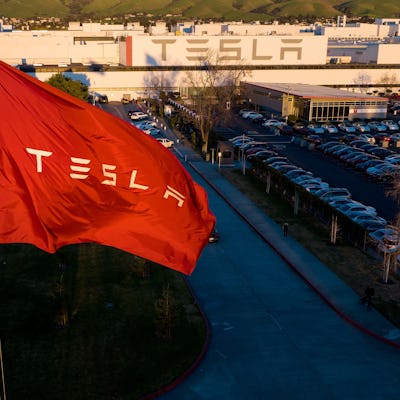“As early as 2012, Black and/or African American Tesla workers have complained ... that swastikas, ‘KKK,’ the n-word, and other racist writing are etched onto walls of restrooms, restroom stalls, lunch tables, and even factory machinery.”
The California Department of Fair Employment and Housing, in a lawsuit filed this week against Tesla

JOSH EDELSON/AFP/Getty Images
California just sued Tesla for pervasive racism
The state of California filed a long-awaited lawsuit against electric automobile giant Tesla this week, alleging a pattern of racist discrimination and harassment at the company’s Bay Area plant.
The suit, filed Tuesday in Alameda County Court by the Department of Fair Employment and Housing claims, among other things, that Black employees at the company’s sprawling factory in Fremont, California, were subjected to “racial slurs by managers and supervisors, segregated to the lowest levels of the workforce, including the contracted workforce, and are severely under-represented in the ranks of executives, senior officials, and managers,” according to a press release from the state.
“As early as 2012, Black and/or African American Tesla workers have complained that Tesla production leads, supervisors, and managers constantly use the n-word and other racial slurs to refer to Black workers,” the suit contends, noting that the Fremont plant’s 15,000-plus workforce constitutes the sole non-union major automobile factory in the country. “They have complained that swastikas, ‘KKK,’ the n-word, and other racist writing are etched onto walls of restrooms, restroom stalls, lunch tables, and even factory machinery. They have complained that Black and/or African American workers are assigned to more physically demanding posts and the lowest-level contract roles, paid less, and more often terminated from employment than other workers.”
In one of the more egregious instances cited in the suit, the DFEH claims a Tesla human resources official “concluded that ‘banana boy’ was simply a ‘nickname,’ not a racial slur” aimed at a Black employee. In another case, allegations of racist harassment were deemed “unsubstantiated” by the company, even though the accused supervisor in question had admitted to using a slur.
In a statement released before the suit was filed, Tesla bristled at the then-forthcoming legal action, claiming the incidents in question largely occurred between 2015-2019, and that company “continues to seek to provide a workplace that is safe, respectful, fair, and inclusive — all of which are vital to achieving our mission.”
California’s suit asks the court to prescribe unspecified punitive damages, as well as “economic damages and equitable relief, including but not limited to reinstatement and/or front pay, pay adjustments, backpay, lost wage, and benefits (including base pay, incentive pay, pension benefits, and awards), in an amount to be proven at trial.”
Despite Tesla’s protestations to the contrary, a pattern of racist abuse at its Fremont plant was already established in court last year, when a jury awarded more than $130 million to Owen Diaz, a Black former employee at the facility, who had sued the company for ignoring repeated instances of racism. “It’s not like they were removing the offensive behavior,” Diaz told The New York Times in October. “They would just let people keep adding and adding.”
The lawsuit comes on the back of a tough week for Tesla and its CEO, Elon Musk, after a group of physicians filed a complaint with the U.S. Department of Agriculture alleging Musk’s “Neuralink” project to implant circuitry into the human brain subjected test monkeys to “extreme suffering” during the project’s experimentation process. Also this week, Tesla recalled nearly 600,000 of its vehicles from United States roadways, after determining the cars’ “Boombox” feature presented an acute danger to nearby pedestrians. That recall follows an even larger callback of more than 800,000 Tesla cars earlier this month, over a faulty seatbelt chime that risked not sounding in cars where the driver was not buckled up.